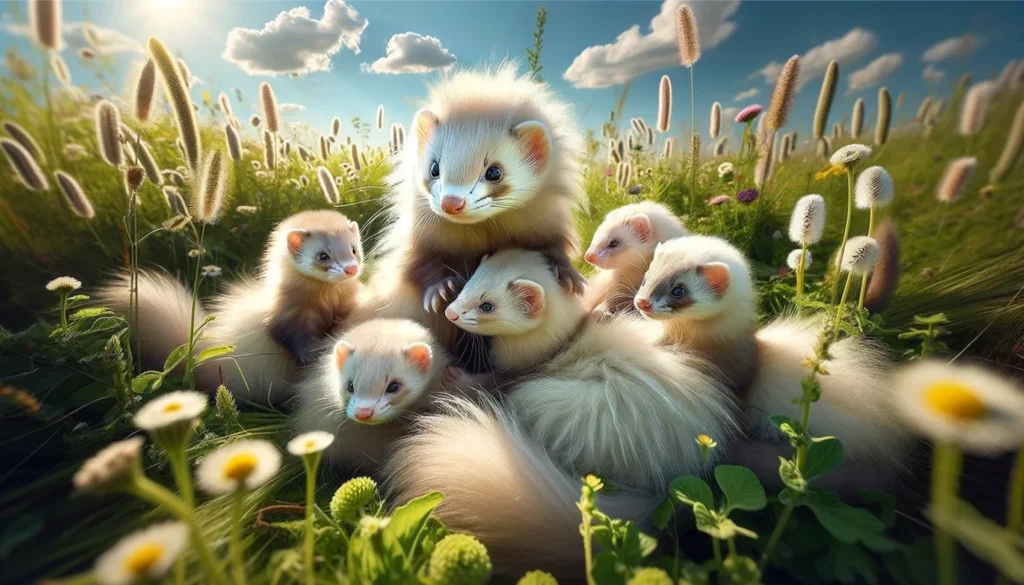Angora Ferrets: The Fuzzy & Friendly Pets
Angora ferrets, sometimes called longhaired ferrets, are a variety of domestic ferret that boasts a beautiful, thick, fluffy coat. These furry creatures make wonderful pets for the right owners. Read on to learn more about these adorable little creatures and what it takes to properly care for them.
Origins & Characteristics
Angora ferrets likely originated when domestic ferrets bred with wild-colored European ferrets that carried the gene for long fur. They come in a variety of colors and patterns, including sable, albino, cinnamon, silver mitt, blaze, panda, and many more.
Some key characteristics of angora ferrets include:
- Long, thick fur about 1-4 inches in length
- Requires a lot of grooming and care to prevent matting
- Typically weighs 2-5 pounds as adults
- Highly active and playful
- Can live 6-10 years with proper care
Many people find angora ferrets just as affectionate and friendly as other ferrets. However, their long coats do come with increased grooming requirements.
The angora ferret symbolizes a blend of intelligence, agility, and perseverance, enhanced by its luxurious coat which suggests rarity, feminine grace, and the need for careful nurturing of unique talents and inner beauty.
Source: https://truespiritanimal.com/
Grooming Needs

One of the biggest responsibilities of owning an angora ferret is committing to regular, thorough grooming. Without brushing, combing, and trimming of their coat, angora ferrets are prone to matting and skin irritation.
Here are some key grooming tips for angora ferrets:
- Brush thoroughly 2-3 times per week – Use a stainless steel comb and/or slicker brush specifically for ferrets. Make sure to get down to the skin. This helps remove loose hair, debris, and redistribute oils throughout their coat. Pay close attention to areas behind the ears and legs.
- Bathe monthly – Give an occasional bath with gentle shampoo made for ferrets. Make sure to thoroughly rinse out all soap. Avoid over-bathing as this can dry out their skin.
- Trim fur – Using blunt scissors, carefully trim long fur around the paws, ears, and rear end every few weeks. This keeps these sensitive areas clean and prevents matting. You can also trim their entire body fur down shorter if desired.
- Take to the vet – If their coat becomes severely matted, take them to the vet to be fully shaved down. Never attempt to cut out actual mats yourself as this risks cutting their skin.
With steady grooming, you can help angora ferrets avoid skin irritation and discomfort from their long locks. Make grooming sessions relaxed and rewarding with lots of praise and treats.
Housing Considerations
Angora ferrets still have the same basic housing requirements as other ferrets but their long fur warrants a few special considerations:
Bedding
- Use liners or blankets that are super soft and smooth to avoid grabbing and tangling their fur
- Avoid rough textures like straw or wood shavings
- Wash all bedding frequently
Cage materials
- Ensure wire cages have rounded edges or cover sharp edges to prevent fur snags
- Use solid flooring over wire flooring
Climate control
- These heat-sensitive pets rely on their coat for insulation so be prepared to alter temperatures
- Install a fan and cool pads to prevent overheating in hot months
- Provide hides, hammocks, and blankets so they can nestle into warmth when cold
Containment
- Thoroughly ferret-proof any play areas
- Fill gaps along floorboards, doors, and walls
- Watch them closely so they don’t wiggle into dangerous tight spaces
Grooming tools
- Stock up on quality combs, brushes, scissors, shampoos before bringing one home
While long-haired, angora ferrets generally thrive in the same environments as typical ferrets. Just consider their fabulous fur when ferret-proofing your home!
Exercise & Play

Angora ferrets share the same needs for ample exercise and playtime every day. Plan at least 4-6 hours per day for your fuzzy friend to roam freely under supervision.
Some great ways to enrich your angora ferret include:
- Ferret-safe toys for chasing, pouncing, and chewing
- Tunnels, bridges, and enclosed play spaces to climb and crawl through
- Ball pits or dig boxes filled with plastic balls or rice
- Allowing them to play with gentle, supervised other pets like cats and dogs
- Take them outdoors on leash walks frequently for extra activity and stimulation
Angora ferrets especially love having places to burrow and hide. Give them blankets, fabric tubes, and even an old t-shirt cut into strips for them to happily tunnel through! Rotate toys frequently to keep things interesting and exciting.
And be prepared for your angora ferret to act just as naughty as any other ferret! Their long fur won’t slow them down from getting into everything they shouldn’t. Ferret-proofing is a must with these agile, curious critters.
Diet & Nutrition
All ferrets, including angoras, require a diet rich in protein and fat to stay healthy. They cannot digest veggies, fruits or grains so avoid these in their meals.
A balanced angora ferret diet consists of:
- High-quality kibble specially formulated for ferrets, available for purchase or from your vet
- Occasional treats of freeze-dried raw meat or eggs
- Continual access to fresh water
Feed your adult ferret kibble dividing their daily portion into 3-4 smaller meals. About 1/8 cup per pound of body weight is a good baseline but adjust according to your ferret’s metabolism and activity level.
Since angoras utilize a lot of energy staying warm and moving all that fur around, they usually need plenty of calories! Monitor your angora’s body condition and adjust food accordingly to keep them fit but not too thin.
Finding an Angora Ferret
Decided these fabulous fuzzballs are the pet for you? Here’s how to go about acquiring one of these special ferrets:
Adoption
- Check local shelters and ferret rescues for adoptable angoras
- Befriend angora ferret owners that may have accidental litters
Purchase from a reputable breeder
- Expect to pay $200-500+ from quality breeders
- Always visit facilities, meet parent ferrets, and see health guarantees
- Avoid pet stores that source from disreputable mass-breeding operations
Grooming services
- Look for local groomers familiar with ferrets to maintain their coat
- Many vet offices also offer ferret grooming
Bringing home an angora ferret is sure to provide you with years of joy, laughter and fluffy cuddles! Just make sure you educate yourself fully on their involved care beforehand.
Frequently Asked Questions
Here are answers to some common questions about owning angora ferrets:
Are angora ferrets harder to take care of?
Angora ferrets require the same basic care as other ferrets but their long coats demands more frequent grooming to prevent matting, skin irritation, and ingestion of fur. Be prepared to brush thoroughly each week and trim fur around sensitive regions. Provide proper housing temperature and safe enclosures to prevent their fur from catching and tangling.
How long is their fur?
Angora ferrets grow a full coat of 1-4 inches long all over their body. Some may even reach lengths of 8 inches without proper trimming! Their fur is thickest around the neck, ears and tail.
Do they shed a lot?
Yes, angora ferrets shed quite heavily – even more than their short-haired cousins. They blow their coat once or twice per year but also drop hair all year round. Be prepared to have fur everywhere if you own one of these pets! Regular brushing helps keep loose hairs under control.
My ferret’s fur got matted – now what?
If an angora ferret’s coat becomes severely tangled or matted, immediately take them to the veterinarian to be fully shaved down. Never attempt to cut out mats on your own as this can injure their skin. Allow their fur to grow out again while sticking to a diligent brushing schedule to prevent repeat matting episodes.
Are angora ferrets rare?
Historically, angora ferrets were quite rare. However, intentional breeding is making these longhaired ferrets more common in the pet trade. Reputable breeders work hard to ensure they breed healthy, friendly angoras that will make wonderful pets. Still, mixed-coat ferrets that carry the gene for long fur also commonly produce “surprise”, hairy babies in typical ferret litters.
Bringing Home an Angora Ferret
Angora ferrets offer fabulous, fuzzy fun for dedicated ferret fans. Their long, silky locks truly make them gorgeous. However, these unique coats comes with added responsibilities for keeping them combed, clean, safely housed, and unfettered by fur balls and mats!
If their special grooming requirements and seasonal shedding seems like too much hassle, consider adopting a short-haired ferret instead. No matter their coat length, ferrets guarantee lively, silly, playful pets full of joy and mischief!

